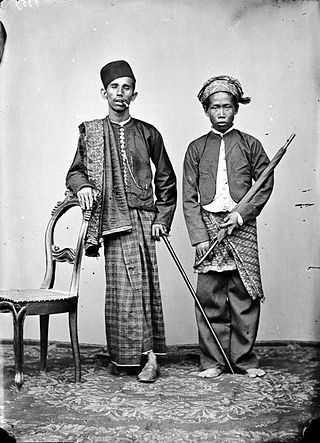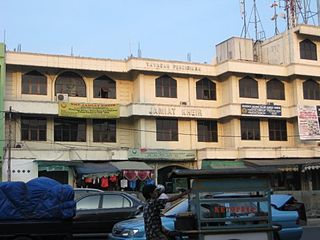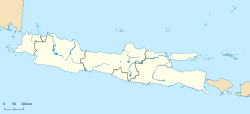
Masjid Haji Muhammad Salleh & Maqam Habib Noh is a mosque and Muslim mausoleum respectively located at 37 Palmer Road, top of Mount Palmer, in Singapore. The mausoleum and its adjacent mosque are under the purview of Majlis Ugama Islam Singapura.

The Gamelan Sekaten is a ceremonial gamelan from central Java, Indonesia, played during the annual Sekaten festival. The word "sekaten" itself is derived from syahadatain or shahada, the first requirement for converting into Islamic faith. Traditionally it is played once per year, on the occasion of Mawlid, Muhammad's birthday, for the week from the 6-12 of the month of Mulud. On this celebration it is brought from the palace at 11 pm to two pavilions before the Great Mosque. It is played every day during that week except the Thursday night/Friday morning. On the eve of the birthday proper, it is returned at 11 pm.

Sekaten is a week-long Javanese traditional ceremony, festival, fair and pasar malam commemorating Mawlid, celebrated annually started on 5th day through the 12th day of Mulud month.
Ahmad al-Muhajir also known as Al-Imām Aḥmad bin ʿĪsā was an Imam Mujtahid and the progenitor of Ba 'Alawi sada group which is instrumental in spreading Islam to India, Southeast Asia and Africa. He was the son of 'Isa the son Muhammad the son of Ali al-Uraydi who was the fourth son of Imam Ja'far al-Sadiq, a fifth generation descendant of Ali and Fatima, the daughter of Muhammad. He was a known acquaintance of Bishr al-Ḥāfī.

The Ba'Alawi tariqa, also known as the Tariqa Ba Alawiyya is a Sufi order centered in Hadhramawt, Yemen, but now spread across the Indian Ocean rim along with the Hadhrami diaspora. The order is closely tied to the Ba'Alawi sadah family.

The Hadharem or the Hadhrami are an Arab sub-ethnic group indigenous to the Hadhramaut region in South Arabia, which is part of modern-day eastern Yemen. They speak Hadhrami Arabic. Among the two million inhabitants of Hadhramaut, there are about 1,300 distinct tribes.

Arab Indonesians or, colloquially known as Jama'ah, and until the 20th century was also called Codjas or Kodjas, are Indonesian citizens of mixed Arab – mainly Hadhrami – and Indonesian descent. The ethnic group generally also includes those of Arab descent from other Middle Eastern Arabic speaking nations. Restricted under Dutch East Indies law until 1919, the community elites later gained economic power through real estate investment and trading. Currently found mainly in Java, especially West Java and East Java, they are almost all Muslims.

Kapitan Arab or Kapten Arab or Head of The Arabs is a position in the colonial Dutch East Indies appointed with the task of leading the ethnic Arab-Indonesians, who usually lived in concentrated clearly defined-living areas. The role was to provide liaison between his community and the government, to provide statistical information to The Dutch East Indies government on issues related to Arabs, to disseminate government regulations and decrees, and to ensure the maintenance of law and order.

Jamiat Kheir is one of a few early private institutions in Indonesia that is engaged in education, and is instrumental in the history of Indonesian struggle against Dutch colonialism, preceding Sarekat Islam and Budi Utomo. It is headquartered in Tanah Abang, Central Jakarta.

Rabithah Alawiyah is an Indonesian Islamic organization engaged in social movements. In general, the organization is an exclusive association of Hadhrami people of Ba 'Alawi sada families. The organization was established on December 27, 1928 CE or 1346 AH, not long after the Soempah Pemoeda October 28, 1928. The organization has a sub-organization called al-Maktab al-Daimi given task to collect, verify and maintain genealogies of Ba 'Alawi sada and print pedigree passes to prove the ancestry of individuals around the world.

The Luar Batang Mosque is one of the oldest mosques in Jakarta, Indonesia, located in the area of Pasar Ikan in North Jakarta on the west side of the Sunda Kelapa Harbor. The mosque was built in the 18th century and named after Luar Batang, in accordance with the nickname of a sacred guardian of Islam, Habib Luar Batang, where his shrine is also located.

Ali bin Abdurrahman al-Habshi, better known as Habib Ali of Kwitang or Habib Ali Kwitang, was one of the leading Islamic clerics and preachers in Jakarta in the 20th century. He was also the founder and chairman of the Majelis Taklim Kwitang and Islamic Center Indonesia, which are the forerunners of other religious organizations in Jakarta.

Pasar Kliwon is a district (kecamatan) located in the southeastern city of Surakarta, Indonesia where Kraton Surakarta is located. It is also the concentrated clearly defined-living area of Arab Indonesians, where many of the occupants make living from textile business. Pasar Klewer, the biggest batik market in Indonesia, is located within the district. Kauman, known as Batik Tourism Village, is also located in this district, which is next to Pasar Klewer.

Usman bin Yahya, Utsman ibn Yahya or Othman bin Yahya was an Islamic scholar who served as Grand Mufti of Batavia in 19th century of Dutch East Indies.
Simtud Durar, Simthud Durar or Simthud Duror is the book of poem praising Muhammad The Prophet of Islam written by Habib Ali bin Muhammad al-Habshi. The poem is usually recited during a Mawlid event. The poem is popular among Hadhrami descents, especially of Sayyids in Hadhramaut, in the island of Java and in the towns of Lamu, Mambrui and Mombasa.

The Great Mosque of Surakarta is an 18th-century Javanese mosque in Surakarta, Central Java, Indonesia. It is the royal mosque of the Surakarta Sunanate.

Drs. Kyai Hajji Habib Ali Alwi bin Thohir Al Husainy is an Indonesian politician, da'i, Islamic scholar and founder of the Pondok Pesantren Modern Al-Husainy, Serpong, South Tangerang, Banten. At the election of regional head and deputy regional head of Tangerang Regency in 2008, Alwi was nominated by the Democrat Party and the National Awakening Party as a candidate for vice regent along with Usamah Hisyam as a candidate for regent, but this pair was defeated by incumbent candidate Ismet Iskandar with Rano Karno as his deputy. Currently, Alwi serves as a senator representing the province of Banten in the Regional Representative Council.

Tarim is a historic town situated in Wadi Hadhramaut, Yemen. It is widely acknowledged as the theological, juridical, and academic center of the Hadhramaut Valley. An important center of Islamic learning, it is estimated to contain the highest concentration of descendants of the Islamic Prophet Muhammad known as the Sadah anywhere in the world. The city is distinguished for producing numerous Islamic scholars, including Imam al-Haddad. Additionally, Tarim is also home to Dar al-Mustafa, a well-known educational institution for the study of traditional Islamic Sciences.


















